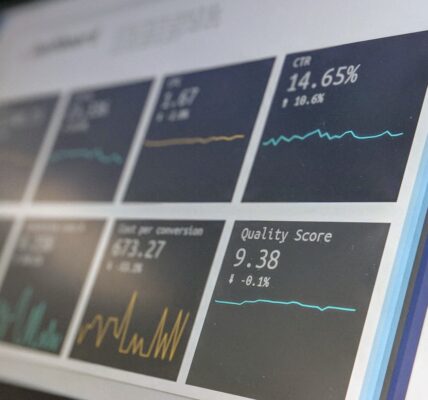Google’s ranking algorithm is a sophisticated and dynamic system that determines the order of websites in search engine results pages (SERPs). This algorithm evaluates numerous factors to assess a website’s relevance and authority, including keywords, content quality, backlinks, and user experience. Understanding the algorithm’s mechanics is essential for website owners and digital marketers aiming to enhance their search engine rankings.
Relevance is a critical component of Google’s ranking algorithm. The search engine strives to deliver the most pertinent and valuable results for user queries. Consequently, websites that effectively demonstrate their relevance to specific topics or keywords are more likely to achieve higher SERP rankings.
This emphasizes the importance of creating high-quality, relevant content to improve search engine performance. Google also considers a website’s authority when determining its ranking. Authoritative websites are more likely to secure higher SERP positions.
Authority is often measured by the quantity and quality of backlinks directing to a website, as well as the expertise and credibility of its content. Websites recognized as authoritative sources of information typically perform better in search rankings.
Key Takeaways
- Google’s ranking algorithm considers hundreds of factors to determine search result rankings
- High-quality and relevant content is crucial for ranking well in Google search results
- Optimizing on-page SEO elements such as title tags, meta descriptions, and headers can improve search visibility
- Building quality backlinks from authoritative websites can boost a site’s credibility and search rankings
- Utilizing local SEO strategies such as creating Google My Business listings can help businesses target local customers
- Improving website speed and user experience can positively impact search rankings and user engagement
- Monitoring and analyzing performance with Google Analytics is essential for understanding website traffic and user behavior
Creating High-Quality and Relevant Content
Focus on Quality and Relevance
This means that website owners and digital marketers should focus on creating content that is well-written, well-researched, and provides real value to their target audience. In addition to quality, relevance is also crucial when it comes to content creation. Google aims to provide users with the most relevant results for their search queries, so websites that are able to demonstrate their relevance to a particular topic or keyword are more likely to rank higher in the SERPs.
Conduct Thorough Keyword Research
To create high-quality and relevant content, website owners and digital marketers should conduct thorough keyword research to identify the topics and keywords that are most relevant to their target audience. They should then use these keywords strategically in their content, including in titles, headings, meta descriptions, and throughout the body of the text. It’s important to note that keyword stuffing should be avoided, as this can have a negative impact on search engine rankings.
Vary Your Content and Use Keywords Naturally
Instead, keywords should be used naturally and in a way that enhances the overall quality and relevance of the content. Additionally, creating a variety of content types, such as blog posts, articles, videos, infographics, and more, can help to engage different segments of the target audience and improve search engine rankings.
Optimizing On-Page SEO Elements

Optimizing on-page SEO elements is another important aspect of improving search engine rankings. On-page SEO refers to the optimization of individual web pages in order to rank higher and earn more relevant traffic in search engines. This includes optimizing elements such as titles, meta descriptions, headings, images, and internal links.
By optimizing these on-page elements, website owners and digital marketers can improve the relevance and authority of their web pages in the eyes of Google’s ranking algorithm. One of the most important on-page SEO elements is the title tag. The title tag is an HTML element that specifies the title of a web page.
It is displayed in the browser’s title bar and is also used as the title of a web page in search engine results. Optimizing title tags with relevant keywords and compelling language can help improve click-through rates from search engine results pages and signal to Google the relevance of the page to a particular topic or keyword. Similarly, meta descriptions are another important on-page SEO element that can impact search engine rankings.
Meta descriptions are HTML attributes that provide concise explanations of the contents of web pages. By optimizing meta descriptions with relevant keywords and compelling language, website owners and digital marketers can improve click-through rates from search engine results pages and signal to Google the relevance of their web pages. In addition to title tags and meta descriptions, optimizing headings, images, and internal links can also have a positive impact on search engine rankings.
Headings should be optimized with relevant keywords to provide structure and context for the content on a web page. Images should be optimized with descriptive file names and alt text to provide context for search engines and improve accessibility for users. Internal links should be used strategically to connect related content on a website and signal to search engines the relevance and authority of individual web pages.
Building Quality Backlinks
| Backlink Source | Domain Authority | Page Authority | Relevance |
|---|---|---|---|
| Example.com | 70 | 65 | High |
| Sample.org | 60 | 55 | Medium |
| Test.net | 50 | 45 | Low |
Building quality backlinks is a crucial aspect of improving search engine rankings. Backlinks are links from other websites that point to a website. They are seen as a vote of confidence in the eyes of Google’s ranking algorithm, as they signal to search engines that other websites find a particular website to be valuable and authoritative.
As a result, websites with a higher number of quality backlinks are more likely to rank higher in search engine results pages. There are several strategies that website owners and digital marketers can use to build quality backlinks. One effective strategy is creating high-quality, relevant content that naturally attracts backlinks from other websites.
By creating valuable and informative content that addresses the needs and interests of their target audience, website owners can increase the likelihood of other websites linking to their content. Additionally, reaching out to other website owners and digital marketers in related industries can be an effective way to build quality backlinks. By forming relationships with other professionals and offering to contribute guest posts or collaborate on content projects, website owners can increase their chances of earning backlinks from authoritative websites.
Another strategy for building quality backlinks is leveraging social media and online communities. By sharing content on social media platforms and participating in relevant online communities, website owners can increase the visibility of their content and attract backlinks from engaged audiences. Additionally, submitting websites to online directories and industry-specific listings can help to build quality backlinks from authoritative sources.
Utilizing Local SEO Strategies
Utilizing local SEO strategies is essential for businesses that want to improve their visibility in local search results. Local SEO is the process of optimizing a website to rank for geographically-related searches, such as “plumber near me” or “best restaurants in [city].” By implementing local SEO strategies, businesses can increase their chances of appearing in local search results and attracting nearby customers. One important aspect of local SEO is optimizing Google My Business listings.
Google My Business is a free tool that allows businesses to manage their online presence across Google, including Search and Maps. By claiming and optimizing their Google My Business listing with accurate business information, high-quality images, customer reviews, and more, businesses can improve their visibility in local search results and attract nearby customers. Another important aspect of local SEO is optimizing website content for local keywords.
This includes incorporating location-specific keywords throughout website content, such as in titles, headings, meta descriptions, and throughout the body of the text. By optimizing website content for local keywords, businesses can increase their chances of ranking for geographically-related searches and attracting nearby customers. In addition to optimizing Google My Business listings and website content for local keywords, businesses should also focus on earning local citations from authoritative sources.
Local citations are mentions of a business’s name, address, and phone number on other websites. By earning local citations from authoritative sources such as online directories, industry-specific listings, and local publications, businesses can improve their visibility in local search results and attract nearby customers.
Improving Website Speed and User Experience

Improving website speed and user experience is crucial for improving search engine rankings. Website speed refers to how quickly a website loads when a user visits it, while user experience refers to how easy and enjoyable it is for users to interact with a website. Both website speed and user experience are important factors in Google’s ranking algorithm, as they impact how users engage with a website and how likely they are to stay on it.
One way to improve website speed is by optimizing images and multimedia content. Large images and videos can slow down a website’s loading time, so website owners should compress images and videos without sacrificing quality in order to improve website speed. Additionally, leveraging browser caching can help improve website speed by storing frequently accessed resources locally on a user’s device.
In addition to improving website speed, website owners should also focus on improving user experience. This includes ensuring that websites are easy to navigate, visually appealing, and mobile-friendly. Websites should be designed with clear navigation menus, intuitive layouts, and responsive design in order to provide a positive user experience for visitors.
Monitoring and Analyzing Performance with Google Analytics
Monitoring and analyzing performance with Google Analytics is essential for understanding how a website is performing in terms of search engine rankings and user engagement. Google Analytics is a free tool that provides valuable insights into website traffic, user behavior, conversion rates, and more. By leveraging Google Analytics, website owners can gain valuable insights into how users are interacting with their website and identify opportunities for improvement.
One important aspect of monitoring performance with Google Analytics is tracking key performance indicators (KPIs) related to search engine rankings. This includes monitoring organic traffic levels, keyword rankings, click-through rates from search engine results pages, bounce rates, and more. By tracking these KPIs over time, website owners can gain valuable insights into how their website is performing in terms of search engine rankings and identify opportunities for improvement.
In addition to monitoring KPIs related to search engine rankings, website owners should also leverage Google Analytics to gain insights into user behavior and engagement. This includes tracking metrics such as page views, time on page, conversion rates, and more in order to understand how users are interacting with their website. By gaining insights into user behavior and engagement, website owners can identify opportunities for improving user experience and increasing conversion rates.
Overall, understanding Google’s ranking algorithm is crucial for improving search engine rankings. By creating high-quality and relevant content, optimizing on-page SEO elements, building quality backlinks, utilizing local SEO strategies, improving website speed and user experience, and monitoring performance with Google Analytics, website owners can increase their chances of ranking higher in search engine results pages and attracting more organic traffic.
FAQs
What is Google search ranking?
Google search ranking refers to the position of a website or webpage in the search engine results pages (SERPs) for a particular keyword or query. The higher a website ranks, the more likely it is to be seen and clicked on by users.
Why is it important to increase Google search ranking?
Increasing Google search ranking is important because it can lead to more organic traffic to a website, which can result in more leads, sales, and overall business growth. Higher rankings also build credibility and trust with users.
What are some strategies to increase Google search ranking?
Some strategies to increase Google search ranking include creating high-quality, relevant content, optimizing website performance and speed, obtaining backlinks from reputable websites, and using relevant keywords in website content.
How long does it take to see results from efforts to increase Google search ranking?
The time it takes to see results from efforts to increase Google search ranking can vary depending on the competitiveness of the keyword and the effectiveness of the strategies implemented. It can take anywhere from a few weeks to several months to see significant improvements in search ranking.
Are there any risks involved in trying to increase Google search ranking?
There are risks involved in trying to increase Google search ranking, particularly if unethical or “black hat” SEO tactics are used. These tactics can result in penalties from Google, which can significantly harm a website’s ranking and visibility. It’s important to use legitimate and ethical strategies to improve search ranking.












